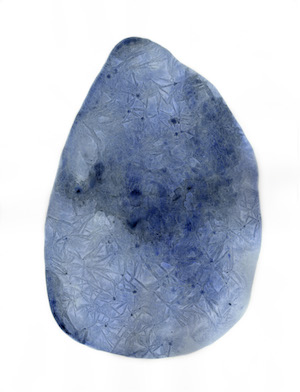Review: Jenn Garland, ‘Dark Skies Ahead’ ·
Paper Mountain ·
Review by Miranda Johnson ·
“Dark Skies Ahead”, currently at Paper Mountain, is another exhibition presented as part of SymbioticA’s Unhallowed Arts festival. Curated by Jenn Garland, the exhibition responds to the 200-year anniversary of the publication of Mary Shelley’s Frankenstein by reflecting on the specificities of the climate at the time the book was written, using this as a starting point from which to examine the responses to our own current period of climate change. For Frankenstein was written in the “year without a summer” – a period of extreme weather triggered by a volcanic eruption in present-day Indonesia. In our present of impending climate doom and catastrophe, this exhibition is concerned with questioning, in Garland’s words, “what we can draw from Mary Shelley’s cautionary tale of unnatural life borne of unrestricted techno-science.”
The works in this exhibition by Angela Garrick, Kynan Tan and Devon Ward, Amy Perejuan-Capone, Kira O’Reilly and Jennifer Willet, and Nathan John Thompson articulate or make concrete the abstract yet alarming fear of impending climate devastation, through creative use of data, emotions, bodies, text or the materiality of the weather itself. In doing so, they consider the ways in which science and technology contain the potential for either rapid progress or total destruction.
Many of the works deal directly with the weather, either to make visible the ways in which it impacts our daily life as a constant material force and an immaterial backdrop to our social interactions, emotions, and politics. Kynan Tan and Devon Ward’s Co•–st•–l W•–ve Tr•–nsl•–tor converts data from buoys in the Indian and Pacific Ocean near the islands of Manus and Nauru into waves of sound. Providing a memorable entry-point into the exhibition, the speakers stand guard near the doorway, sentries that invite – or challenge – the viewer to walk between them. The work makes unavoidable that which is rarely productively discussed in Australian political discourse – both the sea of data relating to our changing climate as well as the toxic political climate and literal environment experienced by refugees imprisoned by the Australian government on these tropical islands.
Other works deal with the humour and pathos of weather-related issues in our daily lives. Angela Garrick’s participatory work encourages us to have a “weather vent” whilst reflecting on the now-defunct ways in which communities have historically communicated in regional areas – an insight that is carried into Nathan John Thompson’s Your future self is watching you through your memories. Here, our changing relationship with technology is reiterated through quotes stretching back through history. Thompson’s work succinctly articulates the stuttering pace at which science and technology changes and mutates – sometimes ahead, sometimes behind our own comprehension of its capabilities. This suggestion of progress, real or imagined, is carried through into Kira O’Reilly and Jennifer Willet’s Untitled (Pig Tales and Showgirls Protocol) in which the sterility of lab environment is undermined, as the messy activity of biotechnological progress unfolds, questioning the ethicality of science that privileges human aims above all else.

Amy Perejuan-Capone’s works were produced on the other side of the globe in the world’s northernmost permanent settlement – Longyearbyen, Svalbard. Her delicate prints were left outside in the freezing temperatures as they dried, with the extreme weather leaving fascinating and intricate patterns that variously look like cracking ice, the surface of the moon, shells on the beach, an ultrasound of the body, and cell samples viewed through a microscope. In these works, the weather is re-centred as an active participant in the complex ecology that makes up our world; a participant that has agency and presence of its own beyond that of human activity.
The distinct and moving works in “Dark Skies Ahead” together interrogate the specificities of location and local environments whilst articulating the large, anonymous sea of data and information that announces the arrival of impending climate disaster.
“Dark Skies Ahead” runs until November 10.
Pictured top: Angela Garrick, “Weather Vent”, 2014-, Document Photo.
Like what you're reading? Support Seesaw.






